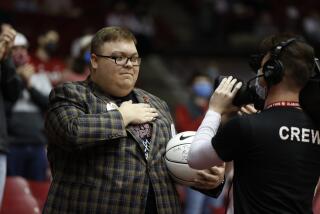He’s Standing Tall, Even From a Wheelchair
- Share via
In 1976, not long after the trampoline accident that broke his neck, paralyzing 20-year-old Mike Flippin, doctors recommended to Flippin’s parents that they terminate their son’s life support. He was on a respirator, unable to move or speak, and had had several incidents of heart and respiratory failure.
As it turns out, Flippin was not in such precarious condition after all: He had learned to manipulate the heart and respiration machines as a way to get attention from the medical staff. After 11 months in intensive care, he returned to his parents’ home in La Verne, where for the next three years he says he did little more than watch “Leave It to Beaver” reruns. But the determined feistiness he showed in the hospital finally managed to resurface--and he has been attracting attention ever since.
When the accident occurred, he had been working as a salesman in a paint store, with no ambition to do much else. But after settling a lawsuit against the establishment where the trampoline accident occurred, he used the money to buy a house and attend Citrus Community College and the University of La Verne.
Deciding to become an attorney, he enrolled at the University of La Verne College of Law, graduating in 1989 after serving as articles editor and technical editor of the Law Review, treasurer of the law fraternity and president of the Student Bar Assn. Today, he heads his own law firm in Claremont, handling cases involving personal injury, employment discrimination and issues of disability. His office is one of the few in the state with an emphasis on litigation under Title 1 of the Americans with Disabilities Act.
“Being an attorney is the key to power, and being able to make things happen,” says Flippin, now 40. “I represent people who have been discriminated against because of the color of their skin, their sex or their religion or who have experienced sexual harassment . . . people who have not been given a job, or been terminated or not allowed to return to their job after a work injury because of their disability.
“I think of myself as a dragon slayer,” he says. “I go after the big guys, based on the bodies of law we have to protect people.”
Flippin’s greatest successes under ADA, he says, regard getting people their jobs back after a disability. “If you put clients back to work, you give them back their self-esteem. One man was injured and went back to work for two years without incident. Just before his 30-year retirement, his employer saw his medical records and put him on medical disability.” He hired Flippin. “In court, the judge confused the client with the lawyer,” Flippin says.
Practicing law from a motorized wheelchair has one benefit, Flippin says. “People always remember me. You go into a courtroom and there are 30 lawyers who all look the same--gray suits, shiny shoes--and the one thing you’ll remember is the one in the wheelchair. I think it’s always an advantage, as long as you make a good impression the first time.”
At least one client says he does not think about the fact that Flippin uses a wheelchair. “As far as I’m concerned, he’s not even handicapped, with the drive he has,” says James Ford of Ontario, who fractured his back almost five years ago when a parking structure collapsed, pinning him inside the truck he was driving. Flippin successfully represented Ford in a jury trial.
“He’s like a god to us,” says Ford, who is now on disability. “He has the heart. A lot of people would want sympathy, but not him. I rest a lot easier at night, knowing I have him to call on.”
That heart is not reserved just for his clients. Flippin, who drives a lift-equipped van, speaks at local schools about his career and about being in a wheelchair, with an emphasis on making good things come from bad. He has served on the board of directors of his law school alumni association for six years, the last three as president, and has been a mentor for several law students. He is also a director for mental health and rehabilitation programs.
He was president of the Claremont- and Covina-based Services Center for Independent Living for one year of his six-year term on that enterprise’s board, and still volunteers as an SCIL peer counselor.
Says SCIL executive director Carol Lane, “We’ve called on Mike many times to be a role model and peer counselor to others who have experienced a catastrophic injury. He will go into the hospital to visit someone and continue to counsel if the individual wishes. Even if they never follow up, the impact of that first visit says volumes about the hope, the possibility of future success.”
As for his own future, Flippin says, “I want to find out what my limitations are. Before I die, I want to find out what I can do. I just keep trying new things. It just seems that if you work hard, there aren’t any limits.”
* This occasional column tells the stories of the unsung heroes of Southern California, people of all ages and vocations and avocations, whose dedication as volunteers or on the job makes life better for the people they encounter. Reader suggestions are welcome and may be sent to Local Hero Editor, Life & Style, Los Angeles Times, Times Mirror Square, Los Angeles 90053.
More to Read
Sign up for Essential California
The most important California stories and recommendations in your inbox every morning.
You may occasionally receive promotional content from the Los Angeles Times.













